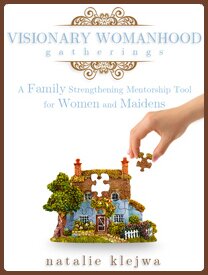The Sin of Forgiveness (WHAT?)
Written by Natalie, Editress of Visionary Womanhood
“There’s an old joke that goes like this—a man jumps off a 100 story building. At the same moment, there’s a man in his apartment on the 50th floor who opens his window for some fresh air. As the man who jumped passes the man with his head out the window, the man in the apartment says, “Hey, how’s it goin’?” The man hurdling through space says, “So far, so good!”
Wrongly offered and/or accepted forgiveness is much the same. When it’s happening it’s great—we get to sin and we’re forgiven! Halleluiah! But, the man who jumped is suddenly going to have to pay the consequences of his actions when his body hits the pavement at 100 mph, just as those who never repent of their sins will on Judgment Day. Without doubt, receiving forgiveness when none should be given is not a blessing, but a curse.” The Sin of Forgiveness pg. 84
Once in a while I participate in a book review “blog tour” and review a new book. When I saw title of this book, I jumped on the tour, hoping to gain some insight into this sometimes confusing subject.
- It intrigued me because of my own personal experience with having to forgive—over and over—people in my life who refuse to repent.
- It intrigued me because I’ve watched so many “Christians” live the life styles of unbelievers—infidelity, swearing, drinking, drug addiction, fornication and so on—and yet everyone is expected to go along with it or be labeled a “judgmental goody goody two shoes.”
100 years ago if a “Christian” girl got pregnant there was a proper shame involved. This shame served as a deterrent in society to the sin that can sometimes result in a pregnancy. Of course, there was redemption for those who repented—which helped the process along. At least that ought to have been the case, as Scripture instructs.
It’s quite different today. Now that same “Christian” girl can live with her boyfriend, have a baby, and get the church to throw a baby shower for her where she breezily shows off her belly to the elderly ladies who have brought food and gifts to encourage her in her sin. On the surface it looks loving.
The fact is—she’s heading for the pavement.
I believe this is the main point of The Sin of Forgiveness by Edward F. Mrkvicka, Jr.
What I Liked
1. Mrkvicka holds up Scripture as our plumb line, and his book is heavy with it. He encourages the reader to seek to understand this issue by studying what the Bible says about it. To that end—he even provides 14 pages worth of Scriptures that speak to the subject.
“If you find that my writings on the subject are not in keeping with God’s Word, reject what I’ve written. Conversely, when listening to others, ensure they can substantiate their views through Scripture.
So many Christians say things like,, ‘I believe…blah, blah, blah.’ I want to talk with Christians, especially pastors, who say, ‘The Bible says…” Beliefs are one thing, and we’re entitled to believe what we wish. But that has no bearing on the truth of God’s Word.”
2. It’s an interesting subject. Here are some quotes that reflect the main point:
“In effect, God says we will be forgiven when we accept His Son as our Lord and Savior, and repent as we are instructed. Then and only then will we be forgiven. Yet society says we are to forgive no matter what. Raped as a little girl? Forgive your rapist—even if he is still raping little girls. While society’s view may seem more spiritually understanding, it comes with consequences that are unacceptable. We aren’t God. We aren’t even God-like. We are all sinners.”
“Let’s review matters. The husband had cheated on his wife throughout their marriage. The wife had always forgiven him. The husband had changed careers and locations whenever he wanted. The wife always went along without rancor. The wife even allowed her young son and daughter to be in their father’s wedding with the woman he committed adultery with. She was told by many that it was the right thing to do.
What are the bottom-line consequences of the husband’s sin’s and the wife’s unconditional forgiveness? The list is not pretty…
Can I assure you that if the wife had said “no” along the way that everything would have turned out as God intended? No, I can’t. But I can say with certainty that their chances would have improved dramatically. Perhaps the husband’s little house of cards would have collapsed more dramatically thereby encouraging him to take a different path. But as he was forgiven and loved no matter what he did, he saw no reason to change. He saw his family’s love as nothing more than a safety net whenever his latest sinful relationship buckled.”
Reservations
1. The structure is somewhat loose. To me, it feels a bit more like a brain dump than an organized, scholarly look at the subject. There are many analogies, which are interesting and helpful, but they don’t necessarily apply if the reader is not convinced of the premise in the first place. I think more space could have been devoted to the argument itself, and if it had been laid out with the counter arguments in a more structured fashion, it would have been even more clear.
2. Related to that is the feeling that it was more emotional than objective. There was an overall flavor of “everyone else pretty much has this wrong.” And, in some ways, I think it could be a matter of semantics. While I’m all about passion—especially when it comes to important issues—I was hoping for a more convincing, objective analysis with less of an emotional flair.
The Bottom Line
This book got me thinking about this subject from a different angle. Of course, the author is not saying that to forgive is a sin. But he is pointing out the fact that forgiveness was purchased for us at the cost of the Son of God, and therefore, it is not to be thought of lightly.
While some Wemmicks will repent and find forgiveness, others will refuse to repent—and forgo the beautiful, costly treasure of forgiveness.
Which kind of Wemmick are you?
(By the way, if you want to read a helpful article on this subject, check out Tim Challies’s Is Forgiveness Conditional or Unconditional? The comments following the post are also very interesting and will get you thinking.)

Tags: book review, forgiveness
























This is a lot to think about. I read the Challies blogpost on it too. I need to think on this some more.
Thanks for sharing this, Natalie. What kept coming to my mind is the fact that we are to become more and more conformed to the image of Christ and in that, He forgave us. “For if you forgive men their trespasses, your heavenly Father will also forgive you. But if you do not forgive men their trespasses, neither will your Father forgive your trespasses.” (Matt. 6:14-15) I do believe in order to be like Christ we must forgive others who have sinned against us…for our own sake. Wounds that aren’t dealt with become festering and bitterness ensues and then that bitterness defiles many.
For their sake, it is also important that we forgive so we can be in right relationship with them in order to bring truth to them. That doesn’t mean that we are now best of friends and we ignore sin. We are called to be discerning and in that we pursue being in right relationship to bring about good for them. That is being concerned for their soul. If they don’t repent after they have been given a grace-filled and merciful presentation of the good news, then we know that we have to leave them in the Lord’s hands. We can still pray for them. No one is lost for eternity, until they are dead. We can only answer for ourselves and we “see through a glass darkly”, at best. I guess this is how I have looked at this for my own life. It is good to think on these things.
Amen, Karen!
I had to come back on here to comment. I have been thinking over this all morning. I think the mistake that this book is making along with possibly the blog post from Challies is that we are not forgiving them of their sin like God does. We are forgiving them for sinning against us. I totally agree with Karen. That type of forgiveness is more for us, to not have bitterness springing up. Their sin against their bodies and God is between them and God.
I think the difference lies in our definition of forgiveness. The argument, if I’m understanding it correctly, is that “forgiveness” that says the other person is no longer responsible for their sin because we’ve “let them off the hook” is unbiblical and not something God would do or WANT us to do. When a person who sins against us (let’s say they sexually molest our daughter) is unrepentant, we don’t “forgive and forget.” God certainly doesn’t. We DO put our focus on God and trust Him for healing and justice. We DO pray for that person to come to a place of repentance so they can be restored. This would be part of our healing – to love them in return for their hatred by praying for their restoration. That doesn’t sound like bitterness to me – but more like living in step with the heart of God on the matter. We stand READY to forgive should God grant them the grace to repent. But we don’t offer them that forgiveness until it actually means something. I’m not saying I know where I stand on this – I’m just trying to restate their position to help make it clear, even in my own mind.
Natalie,
Thanks for contributing to the blog tour.
Shaun Tabatt
Cross Focused Reviews
I’ve been pondering this ever since it was posted. I read the article you linked to, as well as the comments after it. It’s been very thought provoking. I’ve thought a lot about your example of the unmarried pregnant woman. I, too see it as a problem that the church justs accepts blatant open sin, and we’re accused of being judgemental and legalistic if we expect people to actually change when they become Believers. However, while it may be our place to hold each other accountable, I don’t believe it’s our place to forgive people that have sinned against God. We can’t “let them off the hook” for their sin, even if we wanted to. So, I personally don’t think that forgiveness is ours to give or withhold in that type of situation.
As for when someone sins against us, I think we must forgive. I was reading in Matthew 18 this morning and verses 21-35 deal with the subject of forgiving our brother of his sins against us. Jesus gives us no conditions for this forgiveness, but He does give us the only reason that we need. Verse 33 says, “Should you not also have had compassion on your fellow servant, as I also had compassion on you?” Verse 35 says He will punish us if we don’t forgive our brother of his sins against us, from our hearts. The way I see it, which may be entirely wrong, of course, is that I, who have been forgiven of infinitely more than any human being could ever do to me, don’t have the right to withhold forgiveness for so small a debt. No mere man could ever sin against me the way I’ve sinned against God, and yet He chooses to let it go and forgive. My sin may still have earthly consequences, but He still forgives.
Thank you so much for posting this! It really got me thinking.
Natalie, another book on this topic is _Unpacking Forgiveness_ by Chris Brauns, a reformed pastor who may have a better and more persuasive look at what forgiveness is and when it is to be given and when NOT to offer it. He speaks of the forensic nature of forgiveness: it is like a legal transaction, not an emotional capitulation, and once given then you are not to bring up the offense again. As God forgives when we repent, then repentance is involved when we forgive the sins against us. NOT to forgive, however, does not give one the right to harbor bitterness! It means you must maintain a readiness to forgive, and you must allow God to deal with the unrepentant sinner. You must be humble about your own sin, as well, knowing your own propensity to evil. Vengeance is always wrong, even that which is seething anger, gossip, etc.
Yes, I saw that book recommended on Challies’s blog, and I included that in my review on Amazon. I’m glad you brought it up here – and that you gave us a little overview. It clarifies things for me. I definitely want to read that one!